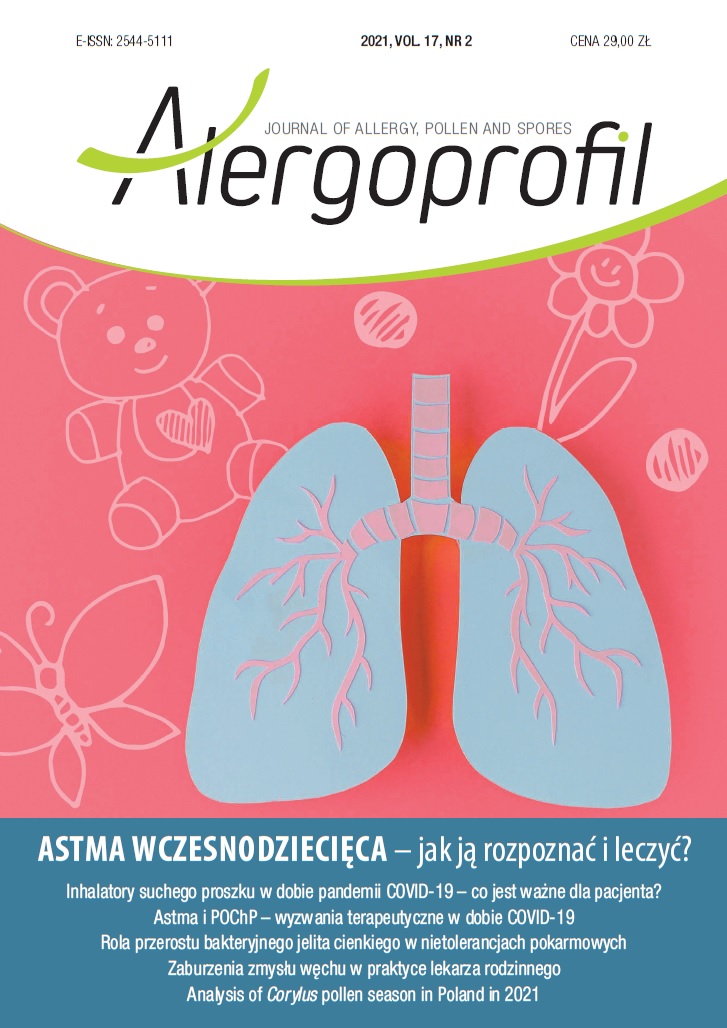Rola przerostu bakteryjnego jelita cienkiego w nietolerancjach pokarmowych Praca przeglądowa
##plugins.themes.bootstrap3.article.main##
Abstrakt
Nietolerancje pokarmowe występują coraz częściej w populacjach krajów rozwiniętych. Jednym z istotnych czynników w etiopatogenezie tego zjawiska są zaburzenia składu flory bateryjnej przewodu pokarmowego człowieka. Rozwój cywilizacji jak i coraz nowocześniejsza produkcja żywności przyczyniają się do częstszego występowania chorób układu pokarmowego, takich jak przerost bakteryjny jelita cienkiego (ang small intestinal bacterial overgrowth, SIBO) i nietolerancje pokarmowe. Schorzenia te mogą występować osobno lub współwystępować u jednego pacjenta. Częstość występowania nietolerancji pokarmowych, podobnie jak alergii wciąż rośnie. Szacuje się, że mogą przyczyniać się do tego takie czynniki jak: stres, nieodpowiedni styl życia, zbyt duże spożywanie przetworzonej, modyfikowanej żywności.
Artykuł przedstawia zależność pomiędzy przerostem bakterii w jelicie cienkim a wpływie na różne aspekty nietolerancji pokarmowych, zarówno w kontekście diagnozy jak i przebiegu tych schorzeń na podstawie najnowszych badań. Przedstawiono także charakter diety low-FODMAP i diety eliminacyjnej, oraz jej wpływ na przebieg kliniczny SIBO i nietolerancji pokarmowych.
Pobrania
##plugins.themes.bootstrap3.article.details##

Utwór dostępny jest na licencji Creative Commons Uznanie autorstwa – Użycie niekomercyjne 4.0 Międzynarodowe.
Copyright: © Medical Education sp. z o.o. This is an Open Access article distributed under the terms of the Attribution-NonCommercial 4.0 International (CC BY-NC 4.0). License (https://creativecommons.org/licenses/by-nc/4.0/), allowing third parties to copy and redistribute the material in any medium or format and to remix, transform, and build upon the material, provided the original work is properly cited and states its license.
Address reprint requests to: Medical Education, Marcin Kuźma (marcin.kuzma@mededu.pl)
Bibliografia
2. Ruscio M. Is SIBO A Real Condition? Altern Ther Health Med. 2019; 25(5): 30-8.
3. Crowe SE. Food allergy vs food intolerance in patients with irritable bowel syndrome. Gastroenterol Hepatol. 2019; 15(1): 38.
4. Tuck CJ, Biesiekierski JR, Schmid-Grendelmeier P et al. Food intolerances. Nutrients. 2019; 11(7): 1684.
5. Esposito S, Biscarini A, Federici B et al. Role of Small Intestinal Bacterial Overgrowth (SIBO) and Inflammation in Obese Children. Front Pediatr. 2020; 8: 369.
6. Pawlak K, Rudzik R, Lewiński M et al. Dieta L-FODMAP w leczeniu zespołu jelita drażliwego. Bromat Chem Toksykol. 2017; 2: 179-83.
7. Olszewska J, Jagusztyn-Krynicka EK. Human Microbiome Project – mikroflora jelit oraz jej wpływ na fizjologię i zdrowie człowieka. Post Mikrobiol. 2012; 51(4): 243-56.
8. Ghoshal UC, Shukla R, Ghoshal U. Small intestinal bacterial overgrowth and irritable bowel syndrome: a bridge between functional organic dichotomy. Gut Liver. 2017; 11(2): 196.
9. Paik CN, Choi MG, Lim CH et al. The role of small intestinal bacterial overgrowth in postgastrectomy patients. Neurogastroenterol Motil. 2011; 23(5): e191-6.
10. Avelar Rodriguez D, Ryan PM, Toro Monjaraz EM et al. Small intestinal bacterial overgrowth in children: a state-of-the-art review. Front Pediatr. 2019; 7: 363.
11. Adike A, DiBaise JK. Small intestinal bacterial overgrowth: nutritional implications, diagnosis, and management. Gastroenterol Clin. 2018; 47(1): 193-208.
12. Tordesillas L, Berin MC, Sampson HA. Immunology of food allergy. Immunity. 2017; 47(1): 32-50.
13. Mądry E, Krasińska B, Walkowiak J. Hipolaktazja, zespół złego wchłaniania laktozy, nietolerancja laktozy. Fam Med Prim Care Rev. 2011; 2: 334-6.
14. Braden B. Methods and functions: Breath tests. Best Pract Res Clin Gastroenterol. 2009; 23(3): 337-52.
15. Bartuzi Z, Ukleja-Sokołowska N. Alergia pokarmowa na mąkę i celiakia. Alergia. 2014; 2: 4-10.
16. Ukleja-Sokołowska N, Zacniewski R, Gawrońska-Ukleja E et al. Food-dependent, exercise-induced anaphylaxis in a patient allergic to peach. Int J Immunopathol Pharmacol. 2018; 32: 2058738418803154.
17. Szilagyi A, Ishayek N. Lactose intolerance, dairy avoidance, and treatment options. Nutrients. 2018; 10(12): 1994.
18. Coffee EM, Tolan DR. Mutations in the promoter region of the aldolase B gene that cause hereditary fructose intolerance. J Inherit Metab Dis. 2010; 33(6): 715-25.
19. Żelowski A, Wojtuń S, Gil J et al. Zespół jelita nadwrażliwego – podstawowe zasady rozpoznawania i leczenia. Pediatria i Medycyna Rodzinna. 2013; 9(3): 250-5.
20. Mehta M, Beg M. Fructose intolerance: cause or cure of chronic functional constipation. Glob Pediatr Health. 2018; 5: 2333794X18761460.
21. Yakoob J, Abbas Z, Khan R et al. Small intestinal bacterial overgrowth and lactose intolerance contribute to irritable bowel syndrome symptomatology in Pakistan. Saudi J Gastroenterol. 2011; 17(6): 371.
22. Zhao J, Fox M, Cong Y et al. Lactose intolerance in patients with chronic functional diarrhoea: the role of small intestinal bacterial overgrowth. Aliment Pharmacol Ther. 2010; 31(8): 892-900.
23. Houben E, De Preter V, Billen J et al. Additional value of CH4 measurement in a combined 13C/H2 lactose malabsorption breath test: a retrospective analysis. Nutrients. 2015; 7(9): 7469-85.
24. Varjú P, Ystad B, Gede N et al. The role of small intestinal bacterial overgrowth and false positive diagnosis of lactose intolerance in southwest Hungary – A retrospective observational study. PloS ONE. 2020; 15(5): e0230784.
25. Silva CD, Leite ID, Rodrigues JW et al. Analysis of lactose intolerance in students with suggestive symptoms of irritable bowel syndrome. Arq Gastroenterol. 2019; 56(3): 304-11.
26. Rana SV, Malik A, Bhadada SK et al. Malabsorption, orocecal transit time and small intestinal bacterial overgrowth in type 2 diabetic patients: a connection. Indian J Clin Biochem. 2017; 32(1): 84-9.
27. Perets TT, Hamouda D, Layfer O et al. Small intestinal bacterial overgrowth may increase the likelihood of lactose and sorbitol but not fructose intolerance false positive diagnosis. Ann Clin Lab Sci. 2017; 47(4): 447-51.
28. Wilder‐Smith CH, Olesen SS, Materna A et al. Predictors of response to a low‐FODMAP diet in patients with functional gastrointestinal disorders and lactose or fructose intolerance. Aliment Pharmacol Ther. 2017; 45(8): 1094-106.
29. Enko D, Kriegshäuser G, Kimbacher C et al. Carbohydrate malabsorption and putative carbohydrate-specific small intestinal bacterial overgrowth: prevalence and diagnostic overlap observed in an Austrian outpatient center. Digestion. 2015; 92(1): 32-8.
30. Hill P, Muir JG, Gibson PR. Controversies and recent developments of the low-FODMAP diet. Gastroenterol. Hepatol. 2017; 13(1): 36-45.
31. Cozma-Petruţ A, Loghin F, Miere D et al. Diet in irritable bowel syndrome: What to recommend, not what to forbid to patients! World J Gastroenterol. 2017; 23(21): 3771-83.

